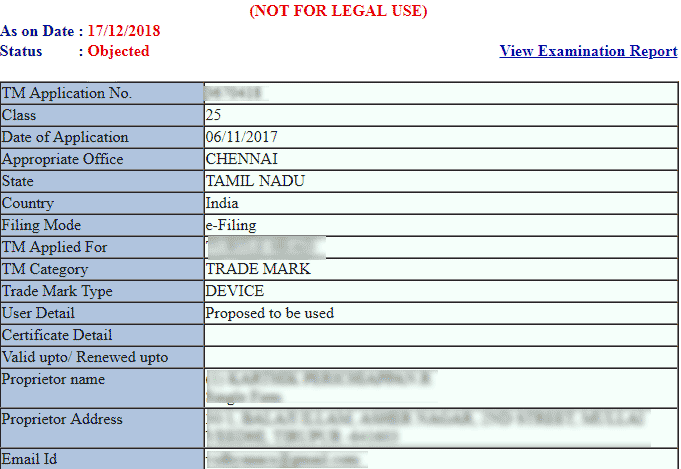Trademark Objection
January 11, 2016 by Tanya Sharma
Trademark Objection are queries raised by Trademark Examiner if the application contains incomplete/wrong information or other similar trademarks have already been filed.
What is Trademark Objection?
As per the provisions of the Trademark Act, the examiner at times, may raise objections in the trademark application. In this case, your trademark application will reflect as Objected.

Why is the Trademark Objected?
A trademark application can be objected under the more than one grounds for refusal. Following are some grounds on which an examiner can object the trademark registration:
1. Deceptive Marks
A trademark which misleads the public about the related goods or services or creates confusion by a vague description are deceptive trademarks. The deception can be related to its use, quality, and character.
2. Lack Distinctiveness
Lack of distinctiveness in the trademark creates a dilemma in public. Marks which are merely descriptive and do not identifies the characteristics of the goods or services are not entitled for trademark protection.
3. The existence of an Identical Trademark
An objection is raised when your mark is similar to a registered trademark as two identical marks may lead to confusion for the public. However; a distinct name can be registered for two similar class of goods.
4. False Specifications of goods or services
A trademark application must be made in respect of goods or services in a particular class. False or incorrect classification may lead to objections. If goods fall in more than one class then, it must be grouped together according to class number.
Other Reasons
1. Incorrect details in Trademark form
If applicant name, principal place or any other information in the trademark application is false then it most likely to raise objection by the trademark examiner.
2. Wrong filing of Trademark form
The examiner can raise objection if the trademark application is filed in the incorrect form. In case your trademark application is filed by a trademark attorney or agent then form TM-48 must be filed and attached to the trademark application.
How to Reply?
The Examination Report issued to the applicant contains detailed reasons of the objections raised by the Examiner and can also be viewed on IP India.
The applicant needs to file TM-O form justifying the issues raised by the examiner. At times, some additional documents may be required in support of your reasons.
Sometimes objections are raised just to seek some information. In that case, you just need to reply with the required information. The applicant must reply to the examination report within 30 days of its issuance failing which the mark can be abandoned.
Trademark Objection Cost
| Trademark Objection Reply | Government Fee | Quick Company Fee | Attorney Fee |
|
MIS-R |
NIL | Rs. 2,999 | Rs. 10,000 |
How to avoid Objections?
As there is no specified process to avoid the trademark objection, the following points can help you to avoid objections:
1.Conduct a Trademark Search
Before filing a trademark application always search your mark. Trademark Search allows you to know the distinctivness of your mark by showing results for any similarities. Quick Company's Trademark Search tool works on a smart alogrithm which automatically conducts a comprehensive research from the trademark database.
2.Avoid Well-Known Trademarks
Never use words of popular brands or any combinations of well-known marks even if the combination of the brand name is available to register. There is always a chance of getting objections if your mark is similar to any popular brand.
3.Refrain from using Prohibited Marks
Prevention of Improper Use (Act 1950) states that nothing of state or national concern like hallmarks, international organisations, armorial bearings that are protected under National Regulations cannot be registered as Trademark. If your mark contains any prohibited or scandalous element then there is a possibility of getting an objection.